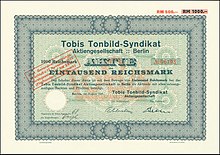UFA GmbH, shortened to UFA, is a film and television production company that unites all production activities of the media conglomerate Bertelsmann in Germany. The original UFA was established as Universum-Film Aktiengesellschaft on December 18, 1917, as a direct response to foreign competition in film and propaganda. UFA was founded by a consortium headed by Emil Georg von Stauß, a former Deutsche Bank board member. In March 1927, Alfred Hugenberg, an influential German media entrepreneur and later Minister of the Economy and Minister of Agriculture and Nutrition in Adolf Hitler's cabinet, purchased UFA and transferred ownership of it to the Nazi Party in 1933.

Sound-on-film is a class of sound film processes where the sound accompanying a picture is recorded on photographic film, usually, but not always, the same strip of film carrying the picture. Sound-on-film processes can either record an analog sound track or digital sound track, and may record the signal either optically or magnetically. Earlier technologies were sound-on-disc, meaning the film's soundtrack would be on a separate phonograph record.

Joe May was an Austrian film director and film producer and one of the pioneers of German cinema.
The Tri-Ergon sound-on-film system was developed from around 1919 by three German inventors, Josef Engl (1893–1942), Joseph Massolle (1889–1957), and Hans Vogt (1890–1979).
Wien-Film GmbH was a large Austrian film company, which in 1938 succeeded the Tobis-Sascha-Filmindustrie AG and lasted until 1985. Until 1945 the business was owned by the Cautio Trust Company, a subsidiary of the German Reichsfilmkammer, and was responsible for almost the entire production of films in the territory of the Ostmark, as Austria was called at that time.
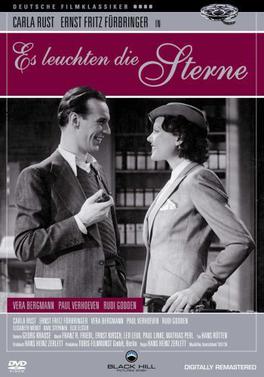
The Stars Shine is a 1938 German musical revue directed by Hans H. Zerlett and written by Zerlett and Hans Hannes.
Werner Hochbaum was a German screenwriter, film producer and director.
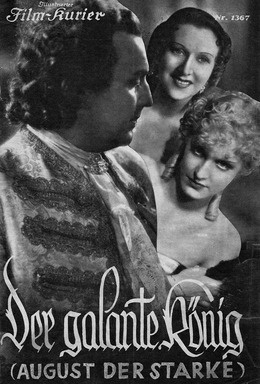
Augustus the Strong is a 1936 German-Polish biographical film directed by Paul Wegener and starring Michael Bohnen, Lil Dagover, and Marieluise Claudius. The film depicts the life of Augustus the Strong, the Eighteenth Century ruler of Saxony and Poland. It was partly shot at the Grunewald Studios in Berlin. The film's sets were designed by the art directors Karl Machus and Ludwig Reiber.
Felsom Film was a film production company which operated in Weimar Germany between 1922 and 1933. It was founded and run by producers Hermann Fellner and Josef Somlo. The company's name is a blend of their surnames.
Fritz Kirchhoff (1901–1953) was a German screenwriter, film producer and director. He was a noted director during the Nazi era, directing film such as the anti-British propaganda thriller Attack on Baku (1942). His 1942 film 5 June, showing the German defeat of France in 1940, was banned by Joseph Goebbels for unclear reasons, although it has been speculated it was to avoid offending the Vichy government. After the Second World War Kirchhoff set up his own production company in Hamburg.
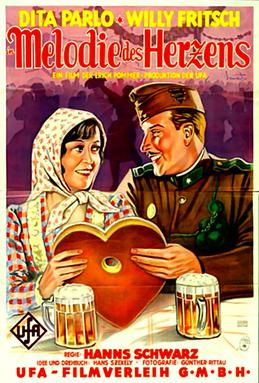
Melody of the Heart is a 1929 German musical film directed by Hanns Schwarz and starring Dita Parlo, Willy Fritsch and Gerő Mály.

The White Peacock is a 1920 German silent drama film directed by Ewald André Dupont and starring Guido Herzfeld, Hans Mierendorff and Karl Platen. It was shot at the Tempelhof Studios in Berlin. The film's sets were designed by the art directors Paul Leni, Robert A. Dietrich and Otto Moldenhauer

The Goose of Sedan is a 1959 French-West German comedy war film directed by Helmut Käutner and starring Hardy Krüger, Jean Richard and Dany Carrel. It was based on the novel Un Dimanche au Champ D'Honneur by Jean L'Hôte. The film was one of a growing number of co-productions between the two countries during the era. It was also released under the alternative title Without Trumpet or Drum.

Adventure in Warsaw is a 1938 German-Polish comedy film directed by Carl Boese and starring Georg Alexander, Paul Klinger and Jadwiga Kenda. The film was the second of two German-Polish co-productions following Augustus the Strong (1936).

A Diplomatic Wife is a 1937 German-Polish comedy film directed by Carl Boese and Mieczysław Krawicz and starring Jadwiga Kenda, Aleksander Żabczyński and Lena Żelichowska. It is the Polish language version of Adventure in Warsaw.
Staaken Studios was a film studio located in Staaken on the outskirts of the German capital Berlin. A large former zeppelin hangar, it was converted to film use following the First World War and operated during the Weimar Republic. In July 1923 it was the largest studio in the world, with floor space of around 18,000 square feet. It was used for the construction of massive sets on a series of major productions of the silent era, including I.N.R.I., Metropolis, The Holy Mountain and The Ship of Lost Souls. These epics were a part of the German attempt on world markets during the decade. The 1927 Anglo-German co-production The Ghost Train was shot at Staaken.

The Tempelhof Studios are a film studio located in Tempelhof in the German capital of Berlin. They were founded in 1912, during the silent era, by German film pioneer Alfred Duskes, who built a glass-roofed studio on the site with financial backing from the French company Pathé. The producer Paul Davidson's PAGU then took control and constructed a grander structure. The First World War propaganda drama The Yellow Passport, the historical comedy Madame DuBarry and the expressionist 1920 silent film The Golem were made there by PAGU.
The Johannisthal Studios were film studios located in the Berlin area of Johannisthal. Founded in 1920 on the site of a former airfield, they were a centre of production during the Weimar and Nazi eras. Nearly four hundred films were made at Johannistal during the silent period. The first production was the 1920 silent Verkommen starring Maria Zelenka. Sometimes known as the Jofa Studios, in 1929 they became the base of the newly established German major studio Tobis Film at the beginning of the sound era.
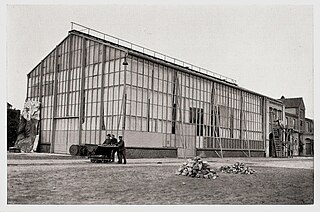
The Terra Studios or Marienfelde Studios were film studios located in the Berlin suburb of Marienfelde.
